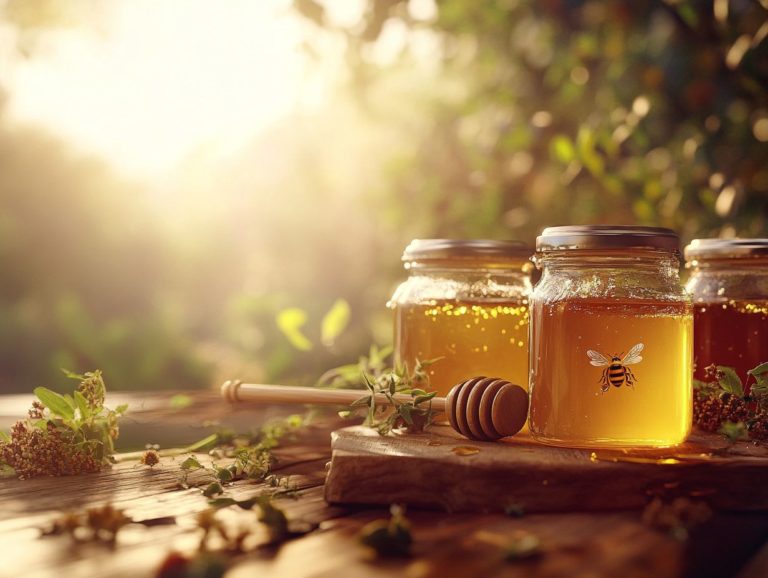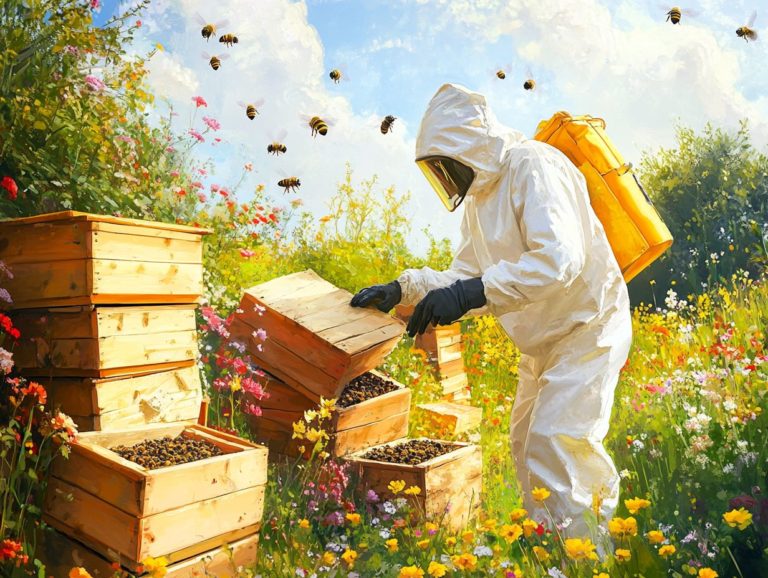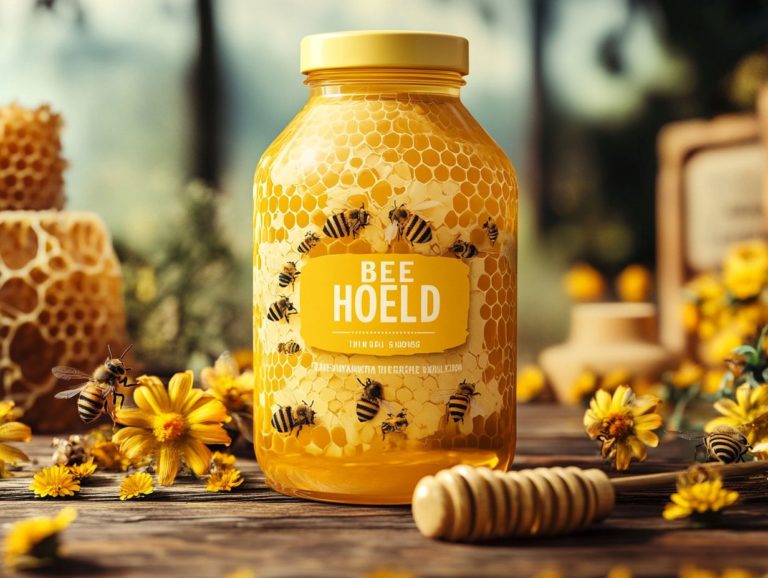5 Reasons to Choose Local Honey Over Commercial Brands
When you consider sweetening your meals, local honey emerges as a healthful and sustainable choice that surpasses commercial brands. Locally produced honey often retains its beneficial compounds and unique flavor.
It not only offers superior nutritional benefits but also contains local pollen, which can help alleviate allergies. By supporting local beekeepers and their sustainable practices, you contribute to strengthening your community while benefiting the environment.
Dive into the unique advantages of local honey, explore the various types available, and discover tips for seamlessly incorporating it into your diet. From raw honey to honey infused with propolis a substance bees make from tree resin that has health benefits the choices are varied and beneficial.
You ll soon discover why local honey should be a staple in your kitchen today, especially for its unique taste and health benefits!
Contents
- Key Takeaways:
- 1. Higher Nutritional Value
- 2. Contains Local Pollen
- 3. Helps with Allergies
- 4. Supports Local Beekeepers
- 5. Better for the Environment
- What Makes Local Honey Different from Commercial Brands?
- Frequently Asked Questions
- 1. Why should I choose local honey over commercial brands?
- 2. How is local honey different from commercial brands?
- 3. What makes local honey a better choice for allergies?
- 4. Is buying local honey more expensive than commercial brands?
- 5. Is local honey sustainably sourced?
- 6. Can I use local honey for cooking and baking?
Key Takeaways:
Here are some important reasons to choose local honey:
- Choose local honey for its higher nutritional value and raw composition compared to commercial brands.
- Local honey contains local pollen, which can help build immunity and fight allergies due to gradual exposure to local flora.
- Support local beekeepers by choosing their honey, positively impacting the environment and local economy.
1. Higher Nutritional Value
Local honey, particularly when sourced directly from beekeepers, offers a nutritional value that far surpasses that of processed alternatives. This superiority stems from its raw composition, which retains natural enzymes, antioxidants, and vitamins often lost in supermarket brands.
Local honey often contains propolis, which adds to its health benefits. By choosing local honey, you bolster your community’s economy and support sustainable beekeeping practices. You also indulge in unique flavors derived from local flora and nectar, making it ideal for health-conscious individuals.
The raw and organic nature of locally produced honey ensures you receive maximum health benefits. In contrast, processed honey undergoes extensive heating and filtration, stripping away many valuable compounds. Raw honey is brimming with antioxidants like flavonoids and phenolic acids, helping combat oxidative stress and may lower the risk of chronic diseases.
It is also a source of essential vitamins, such as vitamin C and B vitamins, which support immune function and energy metabolism. The natural enzymes present in raw honey add to its nutritional edge.
By opting for local honey, you enjoy these health benefits while contributing to the sustainability of local beekeeping. This choice helps preserve the delicate ecosystem while fostering a sense of community pride and connection. Supporting local artisans and their products helps create a resilient local economy.
2. Contains Local Pollen
One remarkable advantage of indulging in local honey lies in its rich content of local pollen. This not only adds a unique touch to its flavor but also plays a crucial role in enhancing health benefits, especially for those with seasonal allergies. Natural exposure to local allergens through honey can help build tolerance over time.
By incorporating this honey into your diet, you may gradually build immunity to the allergens that trigger your symptoms. The small amounts of pollen within the honey serve as gentle exposure for your immune system to the local flora, creating a desensitizing effect that eases your response to larger quantities of pollen during peak allergy seasons.
Bees are diligent gatherers, collecting pollen from nearby plants, and this relationship with the local flora significantly shapes the honey’s flavor profile. The diverse botanicals reflect the surrounding environment, resulting in a distinct taste that varies by region. Therefore, you should be mindful of where you source your honey.
Opting for locally produced varieties enhances your culinary experiences and supports your health initiatives as an allergy sufferer. This type of honey can be particularly beneficial during high pollen count seasons, helping reduce symptoms.
3. Helps with Allergies
Local honey has become quite the buzz as a natural remedy for allergies. It contains pollen from nearby plants, which can help your body develop a tolerance to the allergens prevalent in your environment.
This method of allergy relief is based on helping your immune system respond better to allergens. Research from the Cleveland Clinic indicates that by consuming local honey, you could be introducing tiny amounts of local pollen into your system. This potentially helps your immune response respond better over time.
Keep in mind that environmental factors, such as pollen count and humidity, also significantly affect the severity of allergies. The National Honey Board supports these findings, emphasizing that local honey should be used as a complementary approach to traditional treatments.
A study from the National Honey Board shows that local honey can help, but it s not a miracle cure. It should be seen as a complementary approach to traditional allergy treatments, particularly for those who experience severe seasonal allergies. Embracing a comprehensive strategy can truly make a difference in managing your symptoms.
4. Supports Local Beekeepers
When you buy local honey, you re not just indulging in a superior product; you re also playing a vital role in supporting local beekeepers and championing sustainable agricultural practices. Your choice matters! By buying local honey today, you help protect our bees and support your community.
These beekeepers are essential guardians of bee populations, which are crucial for pollination and the overall health of our ecosystems. By choosing honey from nearby sources, you directly contribute to their livelihoods, helping ensure they can continue their important work.
Supporting local beekeepers promotes sustainable practices and reduces the carbon footprint associated with long-distance food travel. Your consumer choices send ripples through the community, sustaining not only the beekeepers businesses but also bolstering local initiatives focused on sustainable agriculture and education.
Programs aimed at connecting you with local honey producers and raising awareness about the environmental benefits of bee conservation are gaining momentum. This reinforces the notion that every jar of honey you purchase positively impacts both the economy and the ecosystem. Buying products from local artisans also strengthens community ties and supports neighborhood resilience.
5. Better for the Environment
Choosing local honey offers a wealth of environmental benefits, particularly in its critical role in supporting bee populations and pollination, both of which are essential for preserving biodiversity and lowering the carbon footprint linked to food production.
Locally produced honey often involves fewer pesticides and organic methods, making it a better choice for the environment. By sourcing honey from nearby beekeepers, you not only savor the unique flavors that capture the essence of local flora, but you also help stabilize bee habitats vital for effective pollination.
Healthy bees are critical for maintaining ecosystem balance; they pollinate plants that support diverse wildlife and robust agricultural practices. The nectar collection by bees supports various flora, enhancing biodiversity.
The rise of local honey production encourages farmers to embrace organic methods, thereby reducing reliance on harmful pesticides. This harmonious relationship between local honey and sustainable farming practices ultimately cultivates healthier environments, highlighting the crucial connection between flourishing bee populations and vibrant ecosystems. Choosing local honey also helps reduce the environmental impact of long-distance food transport.
What Makes Local Honey Different from Commercial Brands?
Local honey stands out from commercial brands due to its unique production methods and exquisite flavors. It is often raw and unprocessed, capturing the essence of local flora and the skill of dedicated beekeepers.
This raw honey retains its natural enzymes, antioxidants, and beneficial compounds. These elements are frequently diminished or stripped away during the processing of commercial honey. If you re focused on health, this health benefit can translate to enhanced wellness. The presence of local pollen also provides additional advantages, especially for allergy sufferers.
As consumer awareness about honey sourcing continues to rise, many are drawn to local artisans. Their honey offers a richer, more complex taste while supporting sustainable agricultural practices. Choosing local honey means enjoying a superior product that excites your taste buds! You also play a vital role in preserving biodiversity and nurturing local economies, creating a delightful win-win for both the environment and your palate. Local honey is often organic and free from harmful pesticides, adding to its quality.
How Does Local Honey Benefit the Environment?
Local honey plays a crucial role in environmental health by supporting bee populations and their critical role in pollination. Pollination is essential for food production and maintaining ecological balance. The sustainability of local beekeeping practices ensures that these benefits are long-lasting.
When you buy local honey, you help preserve bee habitats, ensuring these important pollinators thrive in their natural environments. It s concerning that recent studies indicate bee populations have plummeted by nearly 30% in recent years due to habitat loss, pesticide exposure, and climate change. This local support helps reduce the carbon footprint associated with food production.
Experts stress that without robust bee populations, the yield of many crops could suffer dramatically, posing a threat to food security. In fact, about one-third of the food consumed globally depends on pollination. This highlights the vital role of bees and the necessity for local initiatives aimed at their protection. Supporting local beekeepers and their sustainable practices is key for both the environment and agriculture.
By supporting local honey, you not only bolster these crucial populations but also enhance practices that support local farming communities and biodiversity. The use of organic methods and the reduced reliance on harmful pesticides further benefit the environment.
What Are the Different Types of Local Honey Available?
You ll discover an intriguing array of local honey types, each presenting its unique flavors and health benefits. These are shaped by the specific floral sources from which bees gather their nectar. From wildflower honey to clover honey, each type offers distinct benefits and unique taste profiles.
Among the standout varieties are wildflower, clover, and buckwheat honey, each with its distinctive profile, offering a pure, local flavor.
Wildflower honey, derived from a diverse selection of blooms, often provides a robust and rich experience with a flavor spectrum that is delightfully unpredictable. Clover honey, on the other hand, is frequently favored for its mild, sweet taste, making it a versatile addition to many dishes and beverages.
In contrast, buckwheat honey stands out with its rich, malty flavor and darker hues. It is packed with nutrients that appeal to those seeking health benefits.
When selecting honey, consider your taste preferences and any potential allergies. Also, check for labels that indicate the floral source; this will help you find the perfect match for your palate.
How Can One Find and Support Local Beekeepers?
Finding and supporting local beekeepers is not just a rewarding endeavor; it s a way for you to enhance community ties while promoting sustainable honey production. You ll often find these treasures at farmer’s markets and local shops.
As you explore these vibrant markets, you won t just discover locally sourced honey; you ll also connect with artisans who are genuinely passionate about their craft. Many online directories can serve as invaluable resources, guiding you to beekeepers in your area and helping you uncover new local favorites, such as those listed by the National Honey Board.
Engaging with local agricultural organizations, like those led by Gregory Bartz, can open doors to workshops or community events where you can meet beekeepers face-to-face.
By supporting these local heroes, you re not only bolstering local economies but also championing environmentally friendly practices that benefit our planet. When you prioritize local beekeepers, you contribute to a healthier ecosystem and play a vital role in ensuring the continuity of these essential pollinators, as noted by the Cleveland Clinic.
What Are Some Tips for Incorporating Local Honey into One’s Diet?
Incorporating local honey into your diet is not only enjoyable but also offers a wealth of health benefits, all while adding a distinctive flavor to various dishes and beverages.
This natural sweetener is a delightful treat that’s brimming with antioxidants and boasts antimicrobial properties, making it an excellent enhancement to your meals. If you’re seeking to elevate your daily routine, consider adding a spoonful of local honey to your warm teas; it can soothe sore throats and give your immune system a nice boost.
Your salads will also shine with a drizzle of honey-infused vinaigrette, a favorite in California, where the sweet notes harmoniously balance the tangy ingredients. Regarding baking, swapping out sugar for local honey not only intensifies flavor but also helps retain moisture in cakes and breads.
Recipes like honey-glazed carrots or yogurt parfaits featuring honey can create delightful dishes that truly showcase the unique profiles of local honey.
Frequently Asked Questions
1. Why should I choose local honey over commercial brands?
There are several reasons to choose local honey over commercial brands. First, local honey is typically fresher and has not been pasteurized, preserving its beneficial nutrients. Second, buying local supports your community and local beekeepers. Third, local honey can help with seasonal allergies due to the exposure to local pollen. Fourth, local honey is usually free from additives or preservatives. And finally, local honey has a unique flavor profile based on the local flora.
2. How is local honey different from commercial brands?
Local honey is different from commercial brands in several ways. Commercial brands may pasteurize their honey, which can destroy some of its beneficial enzymes and nutrients. Local honey is also harvested and sold within the community, supporting local beekeepers and promoting sustainability. Additionally, local honey is free from additives and chemicals that may be present in commercial brands.
3. What makes local honey a better choice for allergies?
Local honey contains small amounts of local pollen, which can help desensitize the body to allergens and reduce symptoms. Commercial brands may contain honey from various locations, making it less effective for allergies. Local honey is also typically fresher and unpasteurized, preserving its beneficial enzymes and antioxidants that can help with allergies.
4. Is buying local honey more expensive than commercial brands?
While the price of local honey may vary depending on location, it is often comparable or even cheaper than commercial brands. By buying directly from local beekeepers, you are cutting out the middleman and supporting your community, which helps keep prices reasonable. Plus, the added health benefits of local honey make it a worthwhile investment.
5. Is local honey sustainably sourced?
Yes, local honey is sustainably sourced because it is harvested and sold within the community. This reduces the carbon footprint of transportation and supports local beekeepers, who play a vital role in maintaining the health of the ecosystem. By choosing local honey, you are promoting sustainability and supporting a more environmentally friendly option.
6. Can I use local honey for cooking and baking?
Absolutely! Local honey can be used in all the same ways as commercial brands, including cooking and baking. It has a unique flavor profile based on the local flora, which can add depth and complexity to your dishes. Plus, by using local honey, you are supporting your community and promoting sustainability in the food industry.



